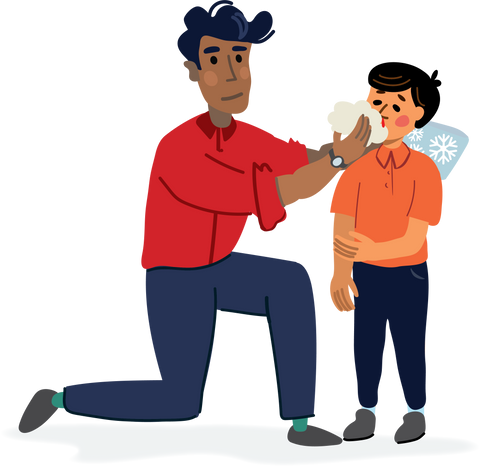Nose Bleed

Blood seeping or flowing from the nose is a sure sign of a nose bleed. Causes include nose picking, strenuous nose-blowing or straining on the toilet, infection in the nose, throat or sinuses, allergy or hay fever, a foreign body up the nose, some medications, or a head or face injury.
There are 5 simple steps to applying first aid to a nose bleed:
1. Lean patient forward, pinching their nose between the bridge and nostrils. Maintain pressure for 10-15 minutes using a tissue or damp cloth to absorb the blood. Apply a covered ice pack or cool towel to the back of the neck if tolerated.
2. Have patient spit out blood and breathe only through their mouth. If bleeding continues, lean patient forward and pinch nose for another 10 mintues.
3. Reassure and rest patient for half an hour, avoid blowing or picking nose.
4. Seek medical assistance if bleeding continues after 20 minutes of pressure.
5. If nose bleed is caused by a head injury, call Triple Zero (000) for an ambulance immediately.
Frequently Asked Questions
When should I seek medical assistance? Seek emergency medical assistance if the patient is injured from a blow or knock to the head, there is continuously heavy bleeding or bleeding lasts longer than 15 minutes, breathing is impaired, patient is vomiting blood or taking blood-thinning medication.
Can a nose bleed be caused by a foreign object up the nose? Young children are known to insert small objects up the nose. In addition to bleeding, there may be an odour or discharge from one nostril, or bad breath. Seek medical assistance to remove the object immediately.
What first aid supplies do I need to treat a nose bleed? Blood-absorbing products such as gauze swabs, combine dressings and tissues are the most commonly used first aid supplies for nose bleed. There may be a need for hypoallergenic paper tape to fix the dressing to the nose, too. A covered ice pack to the back of the neck will help slow down the flow of blood, and may also relieve some anxiety. The first aider should be wearing disposable gloves when in contact with any body fluid.